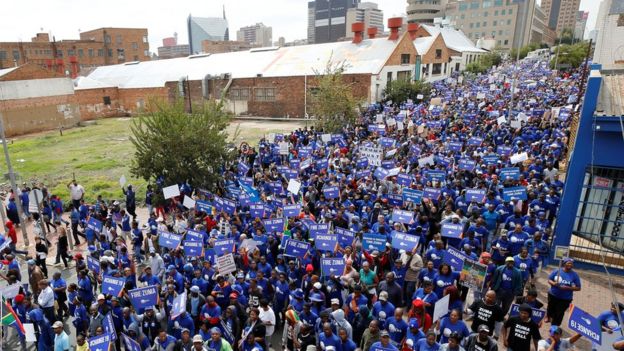
Protesters have marched in cities
across South Africa including Cape Town, Durban, and the capital,
Pretoria calling for the removal of President Jacob Zuma.
The
demonstrations came after Mr Zuma's sacking of a respected finance
minister, which led to the country's credit rating being cut to junk
status.
The move added pressure to South Africa's already embattled economy.
But supporters of Mr Zuma also turned out to defend the president.
This
week Mr Zuma survived calls by powerful groups allied to the governing
ANC for him to go. He also got the backing of a major decision-making
body within the party.
He is not due to leave office until 2019 when his second five-year term comes to an end.
In Johannesburg, there was a heavy police presence as protesters planned to converge near the ANC headquarters.
Hundreds
of veterans of the ANC's armed anti-apartheid struggle and members of
the ruling party's youth wing also gathered outside its headquarters at
Luthuli House to protect the building.
Supporters of Mr Zuma told
the BBC's Milton Nkosi that they came out to promote the president's
policies. They said that Mr Zuma was promising radical socio-economic
change.
One supporter said that it would be wrong to force regime
change in South Africa, adding that such a move would be "going back to
the dark ages of apartheid".
Police fired tear gas and rubber bullets at protesters in one part of Johannesburg, local media are reporting.
Crowds
later gathered outside a compound belonging to the wealthy Gupta
family, which has ties to the president, in Johannesburg's affluent
Saxonwold suburb.
Pictures shared on social media on Friday
showed large crowds assembling in Church Square in Pretoria, despite
confusion over whether demonstrations in the capital are permitted by
law.
Police said on Thursday that marches in Pretoria were illegal
because they had not been granted permission by city authorities. But
this was later overturned by a magistrate.
Protesters in the
capital later marched to the seat of government, the Union Buildings,
waving placards that read: "South Africa is not for sale."
BBC
BBC
No comments:
Post a Comment